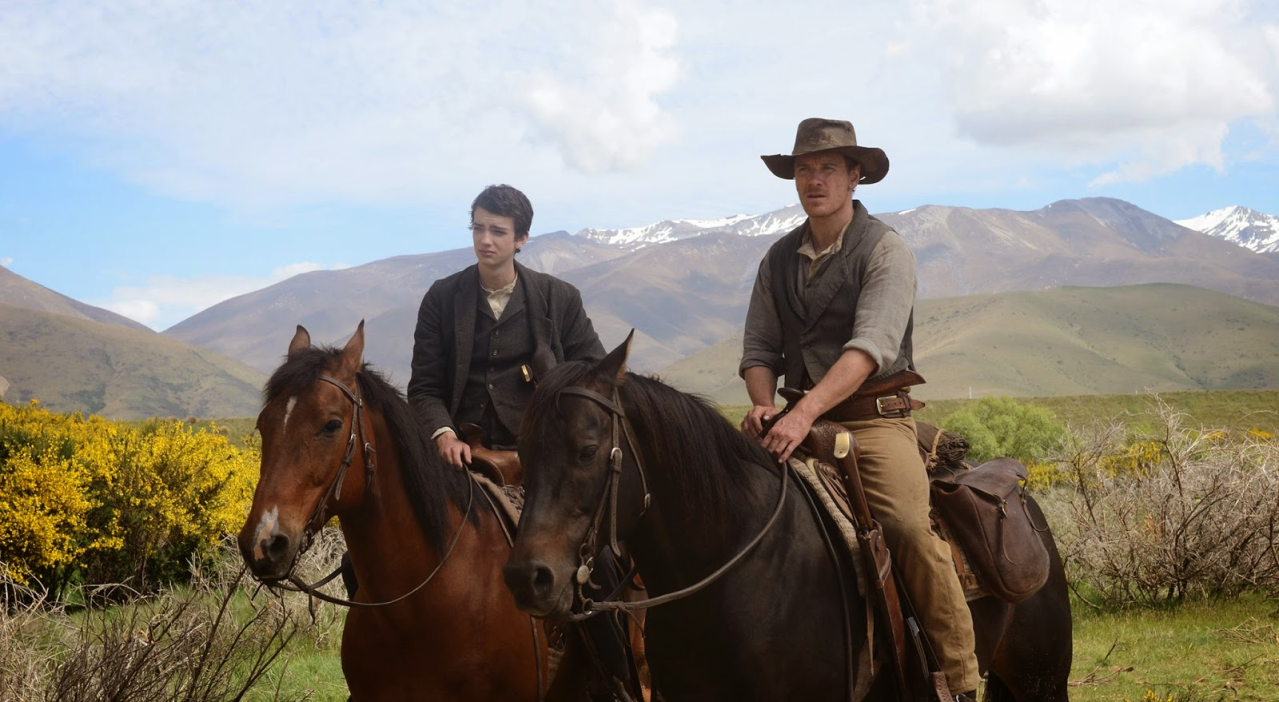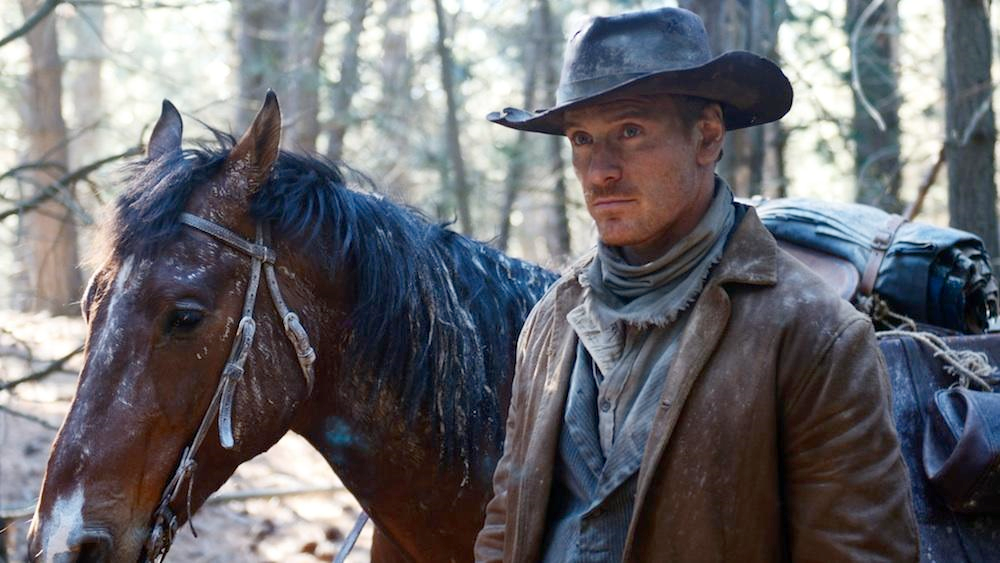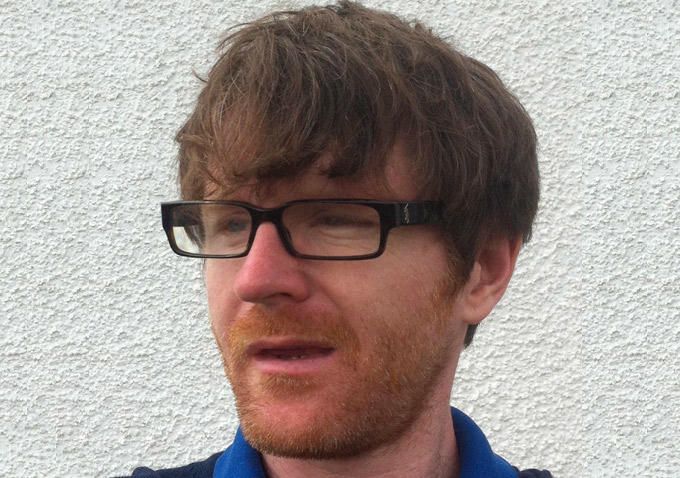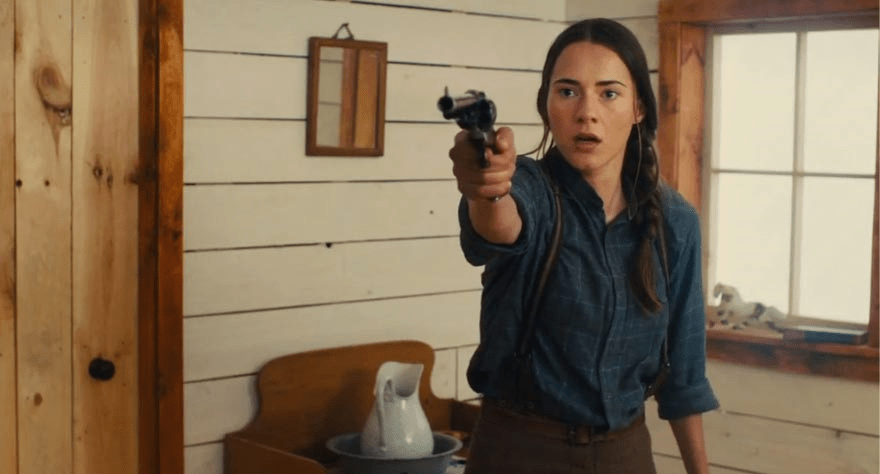John MacLean arrived at Sundance this January with his debut feature Slow West, and walked out with the World Cinema Dramatic Award for Best Picture. Not bad for a professional musician from The Beta Band who’d only previously made two shorts, Man on a Motorcycle and Pitch Black Heist – both starring MacLean’s friend Michael Fassbender. His 1870s Colorado-set New Zealand-filmed western is a surprising twist on the American Western, starring Kodi Smit-McPhee as a 17-year-old who heads west to find his love Rose (newcomer Caren Pistorious), unaware that bounty-hunters are searching for her as well. Oh, and the movie stars Fassbender and Ben Mendelsohn, too. Not bad for a first-timer. MacLean spoke with me during the Tribeca Film Festival to talk about this enjoyable new movie.
Lesley Coffin (TMS): I’m sure you’ve been asked this a million times, but I need to know what made you think, “I have to throw my own western into the vast collection of westerns we already have?”
John MacLean: That was the thought I had in the back of my own mind the whole time, because it is an intimidating genre, especially when I started bringing it around to American audiences. But I thought being from Scotland and seeing America a lot when I was younger, I could present an image of America through a tourist’s eyes, and say something truthful about America. And I’ve met a lot of people that will tell me after seeing the film “my grandfather was Scottish” or “my grandmother was Irish” and it reminds me of the fact that the American West has this immigrant past that isn’t brushed upon in many westerns. The west is full of Irish, Scottish, Germans, Africans, all types of people. And I wanted to bring in a fairytale elements I love to comment on the story’s universal truths.
TMS: The main villain is very different from most of the western villains we’ve seen. What was the inspiration for Payne?

MacLean: When I wrote the character, I was thinking of a character from McCabe & Mrs. Miller that is British and a bad guy. And I liked the idea of the bad guy being well-educated and wouldn’t be the cliché spitting, grunting baddie. Sometimes the more well-educated a bad guy is, the more terrifying they seem. That is the case in Die Hard with Alan Rickman’s baddie, a man who seems well-read and well spoken. And Ben [Mendelsohn] has that side to him too. He’s a very well-read and intelligent person, and can play a great polite baddie. So in the script, I wrote him to be a polite, well-traveled, well-educated bad guy.
TMS: I thought about McCabe & Mrs. Miller watching the movie, and Kodi [Smit-McPhee] reminded me of Keith Carradine’s sweet “kid” character, both being these decent, fragile men with no business being in the west. And Michael Fassbender’s character is an anti-hero in this, but I still found him to be completely likeable and charming.
MacLean: I think 50% of that came down to the way Michael played the role. The fact that he can start out a movie by shooting someone in the head and remain likeable throughout the movie, is because of his own personality but also his ability to judge the character as someone who will continue to be likable. And some was in the script, because we know that the man he shoots is a bad guy that has been slaughtering Native Americans. And he’s helping the young kid, so as long as we have that, the audience will remain on his side. And all the characters do bad stuff, so you just have to balance it out and remind the audience that these are desperate times. And shooting the film in a way so the audience doesn’t enjoy the violence was important, because I always think the worst movie violence is always torture, because of the enjoyment you see characters getting out of the violence. And for me, that kind of violence is almost unwatchable. So as long as that isn’t happening, you’re kind of okay.
TMS: The band of bounty hunters are the baddies, but they are also the closest thing we see of a close family in the movie. Were you thinking of the role the family has in the west?
MacLean: It was more the fact that every character had to be a mix of both good and bad, and remind the audience they are in desperate circumstances and just trying to survive, like the husband and wife at the beginning of the film. And make sure they were all always sympathetic characters, so you aren’t rooting for the goodies to beat the baddies. Some movies really play on that idea, but there are others where really, you just want everyone to get out with their lives. And I liked the idea of the kids joining the bounty hunters because you see them swinging from good to bad, based only on their circumstances and survival, and this is just one part of their journey.

TMS: Rose is a great character, and is so appealing for audiences who might think of the western who don’t like the traditional “men only” westerns, because she stands up for herself and is very intelligent. Were you thinking about any female characters from other action films when writing her character?
MacLean: Not at all really. I was just thinking about what seemed to be lacking in a lot of action films. I watched certain films, even movies from last year, where the woman is just a damsel in distress. And while I don’t have a t-shirt that says feminist on me at this second, I just felt that was awful in this day and age to still see that. So I wanted to comment on what I’ve seen in real life.
TMS: I loved that she is the most pragmatic character in the movie.
MacLean: And she sees all this coming, unlike her father. She was a fun character to write, and Caren was an unknown actress, but just got the character straight away. She nailed the character and got the accent right away. She is beautiful and sweet enough for a kid to travel across the world for her, but when the trouble comes, she will stand up to it.
TMS: Throughout the film, the characters are always passing the massacre of the Native Americans, so it becomes a background story that is incredibly powerful to see. Why did you feel it needed to be a part of the film?
MacLean: I think avoiding it would have been a massive insult because it is such an important part of the history of the country. There was an interesting documentary Ken Burns did on the history of the west, and you really get a sense of repeated destruction that occurred. And not just to the Native Americans, but the Chinese people who came over to build the railroad. I wanted to comment on it, without placing at the forefront because I’m not Native American myself and I thought I couldn’t do it truthfully. But from Jay’s point of view, floating through this new land, it had to be there.
TMS: Filming in New Zealand, was it a challenge to find locations that mirrored the Western landscapes of America?
MacLean: It was actually the opposite. It was much easier than I thought it would be. It was amazing the number of locations we found in New Zealand which were specific to what I wrote in the script. The wedge of a rock a buffalo could get stuck in, it was right there. But I originally resisted filming in New Zealand because like every filmmaker, you want to film where the film is set. But as soon as I got there, I realized it would be much more manageable. And a lot of people who have seen the film tell me they like the fact that it isn’t a recognizable image of America, it adds to the feeling that it is a dreamscape.

TMS: The movie is beautiful, and I loved how many scenes you staged in the middle of the day that most filmmakers would have staged at night.
MacLean: I guess people think to have atmosphere, you have to have grittiness, and I wanted everything to be visible so the violence was juxtaposed to the beauty of the land.
TMS: The movie is an unapologetic genre western, and your shorts were also within specific genres. Do you find working with genre conventions helpful as a filmmaker?
MacLean: Well, they are the films I grew up loving. But you have to pick a genre, know the rules, and then come in with something new. Be playful with a genre, that’s what the Coen Brothers do so well. You have to play and tinker with genre to challenge people’s expectations. That is the fun part of working within genres.
Lesley Coffin is a New York transplant from the midwest. She is the New York-based writer/podcast editor for Filmoria and film contributor at The Interrobang. When not doing that, she’s writing books on classic Hollywood, including Lew Ayres: Hollywood’s Conscientious Objector and her new book Hitchcock’s Stars: Alfred Hitchcock and the Hollywood Studio System.
–Please make note of The Mary Sue’s general comment policy.–
Do you follow The Mary Sue on Twitter, Facebook, Tumblr, Pinterest, & Google +?








